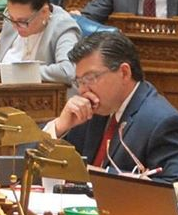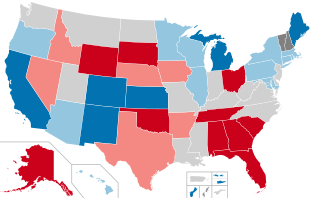
The president of Turkey, officially the president of the Republic of Türkiye, is the head of state and head of government of Turkey. The president directs the executive branch of the national government and is the commander-in-chief of the Turkish military. The president also heads the National Security Council.
A write-in candidate is a candidate whose name does not appear on the ballot but seeks election by asking voters to cast a vote for the candidate by physically writing in the person's name on the ballot. Depending on electoral law it may be possible to win an election by winning a sufficient number of such write-in votes, which count equally as if the person were formally listed on the ballot.
Age of candidacy is the minimum age at which a person can legally hold certain elected government offices. In many cases, it also determines the age at which a person may be eligible to stand for an election or be granted ballot access.

The government of Florida is established and operated according to the Constitution of Florida and is composed of three branches of government: the executive branch consisting of the governor of Florida and the other elected and appointed constitutional officers; the legislative branch, the Florida Legislature, consisting of the Senate and House; and the judicial branch consisting of the Supreme Court of Florida and lower courts. The state also allows direct participation of the electorate by initiative, referendum, and ratification.
State ratifying conventions are one of the two methods established by Article V of the United States Constitution for ratifying proposed constitutional amendments. The only amendment that has been ratified through this method thus far is the 21st Amendment in 1933.

The lieutenant governor of New Jersey is an elected constitutional officer in the executive branch of the state government of New Jersey in the United States. The lieutenant governor is the second highest-ranking official in the state government and is elected concurrently on a ticket with the governor for a four-year term. The position itself does not carry any powers or duties other than to be next in the order of succession, but the state constitution requires that the lieutenant governor also be appointed to serve as the head of a cabinet-level department or administrative agency within the governor's administration, other than the position of Attorney General.

The 2006 South Carolina State Elections took place on November 7, 2006, and included the gubernatorial election. All nine popularly elected constitutional officers were up for reelection, and all races except the Attorney General's were contested. The entire South Carolina House of Representatives, one state senator and six state circuit solicitors were also up for election. Several constitutional amendments were also on the ballot.
A judicial retention election is a periodic process in some jurisdictions whereby a judge is subject to a referendum held at the same time as a general election. The judge is removed from office if a majority of votes are cast against retention.
This article delineates the age of candidacy laws of the federal government and individual states of the United States. The US has historically had minimum age requirements for many positions, ranging from President to local members of city council. While there is no maximum age limit or point of forced retirement - other countries like Canada enforce retirement ages on judges and senators - there are term limits in some cases, most notably a limit of 2 full terms for the President of the United States.

Anthony Mark Bucco is an American lawyer and Republican Party politician currently serving as the State Senator for New Jersey's 25th Legislative District. In 2019 Bucco was accused by Lisa Brewer that Bucco cost her millions by cutting her out of her mother’s will. He had been a member of the New Jersey General Assembly since 2010 and was appointed to the State Senate in 2019 following the death of his father, incumbent Senator Anthony R. Bucco.

Proposition 8 of 1911 was an amendment of the Constitution of California that introduced, for the first time, the recall of public officials. This allows the governor, state senators and assemblymen, and other elected officials to be removed from office early by a public vote. It was approved by voters in a referendum held as part of a special election on 10 October. On the same day voters approved two other major political reforms, Proposition 4, which granted women the vote, and Proposition 7, which introduced the initiative and the optional referendum.

Quinto v. COMELEC is a controversial decision of the Supreme Court of the Philippines which paved the way, albeit temporarily, for incumbent appointive executive officials to stay in office after filing their certificates of candidacy for election to an elective office. The decision was first decided by a slim majority of 8-6, but was eventually reversed 10-5 upon a motion for reconsideration after the retirement of one justice and the appointment of two new ones.

The 2012 United States presidential election in New Mexico took place on November 6, 2012, as part of the 2012 United States presidential election in which all 50 states plus the District of Columbia participated. This was the 25th U.S. presidential election in which New Mexico participated. New Mexico voters chose five electors to represent them in the Electoral College via a popular vote pitting incumbent Democratic President Barack Obama and his running mate, Vice President Joe Biden, against Republican challenger and former Massachusetts Governor Mitt Romney and his running mate, Congressman Paul Ryan.

United States gubernatorial elections were held on November 8, 2022, in 36 states and three territories. As most governors serve four-year terms, the last regular gubernatorial elections for all but two of the seats took place in the 2018 U.S. gubernatorial elections. The gubernatorial elections took place concurrently with several other federal, state, and local elections, as part of the 2022 midterm elections.

The 2024 United States elections are scheduled to be held on Tuesday, November 5, 2024. During this presidential election year, the president and vice president will be elected. In addition, all 435 seats in the United States House of Representatives and 34 of the 100 seats in the United States Senate will be contested to determine the membership of the 119th United States Congress. Thirteen state and territorial governorships and numerous other state and local elections will also be contested.

The 2026 Florida gubernatorial election will take place on November 3, 2026, to elect the governor of Florida, alongside the elections to the United States House of Representatives and other state and local elections. Incumbent Republican Governor Ron DeSantis, who will be ineligible from running because of term limits by the Florida Constitution, cannot seek re-election to a third consecutive term.

United States gubernatorial elections are scheduled to be held on November 3, 2026, in 36 states and three territories. The previous gubernatorial elections for this group of states took place in 2022, except in New Hampshire and Vermont, where governors serve two-year terms and will elect their governors in 2024. Many races have an incumbent who is term-limited.

Tennessee state elections in 2022 were held on Tuesday, November 8, 2022. Primary elections for the United States House of Representatives, governorship, Tennessee Senate, and Tennessee House of Representatives, as well as various judicial retention elections, including elections for all five Tennessee Supreme Court justices as well as general local elections, were held on August 4, 2022. There were also four constitutional amendments to the Constitution of Tennessee on the November 8 ballot.

The 2024 Wisconsin fall general election will be held in the U.S. state of Wisconsin on November 5, 2024. In the presidential election, voters will be choosing ten presidential electors. Wisconsin's junior United States senator, Tammy Baldwin, will be running for re-election, and all of Wisconsin's eight seats in the United States House of Representatives will be up for election, as well as sixteen seats in the Wisconsin Senate and all 99 seats in the Wisconsin State Assembly. The 2024 fall partisan primary will be held on August 13, 2024. The filing deadline for the Fall election is June 3, 2024.












